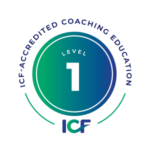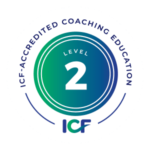ICF Journey
From learning the various levels of ICF coaching certification to learning the key ICF competencies, we’ll provide you with the tools and knowledge you need to take your ICF certification to the next level.


Starting a Journey in ICF Credential
The International Coach Federation (ICF) Credential is a professional certification process that can be exhilarating and involve self-discovery at the same time. Whether you’re an experienced coach looking to improve your skills and competencies or just starting out in the coaching world, this ultimate ICF certification guide will guide you through every step of your ICF certification journey. From learning the various levels of ICF Credentials to learning the ICF competencies, we’ll provide you with the tools and knowledge you need to take your ICF Credentials to the next level.

The International Coaching Federation (ICF) was founded in 1995 as a nonprofit organization for fellow coaches to support each other and grow the profession.
ICF offers three credentials, each corresponding to the amount of education and experience required to earn it. Earning an ICF Credential provides instant credibility and increased visibility to prospective clients.
Associate Certified Coach (ACC)
Associate Certified Coach (ACC) is an entry-level Credential, a professional certification requiring 60 hours of coach-specific education. They are aligned with the ICF definition of coaching, ICF Core Competencies, and ICF Code of Ethics.
Professional Certified Coach (PCC)
As a Professional Certified Coach, a coach must demonstrate high expertise and experience in their field. To be eligible for the PCC, a coach must have completed at least 125 hours of specialized training and a predetermined number of hours of coaching experience. This certification demonstrates a coach’s proficiency and professionalism in the coaching field.
Master Certified Coach (MCC)
The MCC (Master Certified Coach) is the highest credential the International Coaches Foundation (ICF) offers. To be certified as an ICF Master Certified Coach, a coach must have completed at least 200 hours of Coaching-specific Training and have substantial Coaching experience. An MCC certification demonstrates a coach’s mastery of Coaching skills, competencies, and ability to collaborate with clients at a high level.
Any aspiring coach needs to research and understand the requirements and benefits of each level of credentials to determine which level is most appropriate for their career objectives and aspirations. The three levels of certification are Associate Certified Coaches (ACC), Professional Certified Coaches (PCC), and Certified Master Coaches (MCC), each of which has its own unique set of requirements and advantages.
Benefits of Obtaining ICF Accredited Coach Training Programs
Credibility and recognition: The International Coaching Foundation (ICF) is the world’s largest and most prestigious professional ICF coaching certification programs. Being an ICF certified coach implies you believe in high-quality coaching and ethical behavior.
Access to a Global Network: ICF certification is the most respected and largest professional coach accreditation. ICF certified coaching programs provide the finest coaching and uphold the highest ethical standards.
Continuous Professional Development: Keep current with the newest coaching trends, studies, and best practices with ICF’s educational resources. From webinars and workshops to publications, ICF has everything you need to stay on top of your professional development.

The ICF Coaching Journey
- Choose Your Training Program: Find an ICF accredited coach training program that fits your coaching needs and wants. Think about what kind of program you want, how long it’ll last, who the faculty members are, and how much it’ll cost.
Enquire Now
Coach / Trainer
Sivakumar Padmanabhan
Vijaya Madhavi
Janki Bhatt
- Complete the Training Program: Participate in the ICF certified coaching programs. The ICF accredited coaching courses typically combine theoretical knowledge with practical skills development, coaching practice, synchronous Classes, Group discussions, and Assignments to Understand the skills, competencies, principles, context, approach, and methods of coaching.
- Experience & Accumulate Coaching Hours: Applicants for the ICF ACC, PCC, and MCC Credentials must meet designated coaching experience requirements for eligibility. Specific requirements vary by credential level. These hours may be acquired through coaching clients, pro bono work, or supervised coaching sessions.
- Mentor coaching: It’s a great way to get feedback and guidance from an ICF certified coach, and it can help you hone your coaching skills, better understand your style, and get ready for your certification. Mentor Coaching for an ICF Credential consists of coaching and feedback in a collaborative, appreciative, and dialogue process based on an observed or recorded coaching session to increase the coach’s capability in coaching in alignment with the ICF Core Competencies.
- Performance Evaluation: As part of the Credentialing process, applicants must pass a Performance Evaluation. The purpose of the Performance Evaluation is to ensure the applicant’s coaching is aligned with the ICF Core Competencies and demonstrates the coaching skills required at each level of credentialing.
- Submit Your Application: Once the ICF approved coaching programs are completed and the necessary coaching hours have been accumulated, the applicant can submit their ICF certification application. This application must prove their coaching experience, educational background, and mentor coaching.
- Pass the Coach Knowledge Assessment: Pass a written exam designed to test your understanding of and ability to apply the ICF definition of coaching, ICF Core Competencies, and ICF Code of Ethics. The ICF Credentialing Exam measures a coach’s knowledge of and ability to apply the ICF definition of coaching, the updated ICF Core Competencies, and the ICF Code of Ethics against a predetermined standard. The exam is informed by coach practitioners worldwide who served as subject matter expert volunteers in its development and in establishing the exam scoring standard.
ICF certification also means you’re part of a worldwide network of professional coaches. ICF provides networking opportunities, conferences, and online forums where coaches can connect and learn from one another. By joining this community, you can access support, resources, and opportunities to collaborate with your coaching business. Getting started with an ICF accredited coach training program can be both difficult and rewarding. By learning about the ICF, choosing the best ICF accredited coaching programs, selecting a specialty, preparing for the ICF exam, continuing your training, and becoming an ICF certified coach, you can prepare yourself for success as an ICF coach. Are you ready to get started?
POPULAR TAGS :
ICF Certified Coach, ICF Certified Coaching Programs, ICF Coaching Certification Programs, Best ICF Accredited Coaching Programs, ICF Approved Coaching Programs, ICF Accredited Coach Training Program, ICF Accredited Coaching Courses, Master Certified Coach, Top ICF Coaching Programs, Best ICF Accredited Coaching Programs Online, ICF Certified Coaches, ICF Certified Coach Training Programs, ICF Approved Coach Training Programs, ICF Accredited Coaching Training Program, Certified Master Coach, ICF Master Certified Coach






